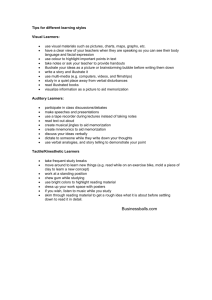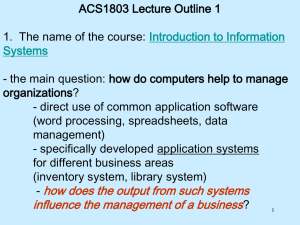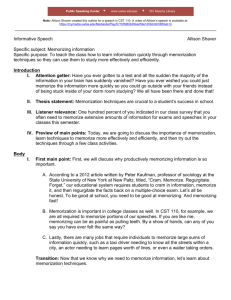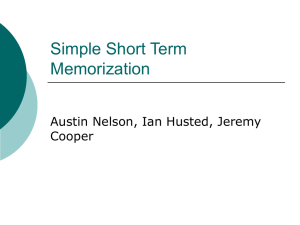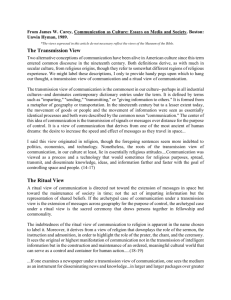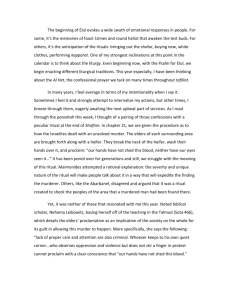masonic memory techniques
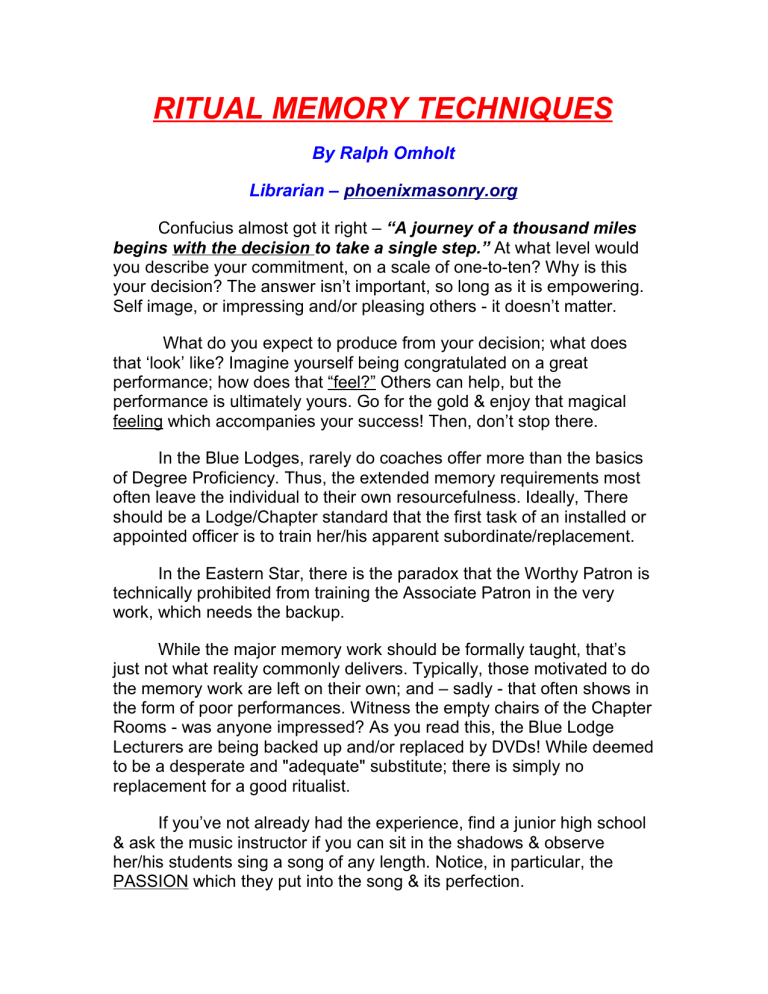
RITUAL MEMORY TECHNIQUES
By Ralph Omholt
Librarian – phoenixmasonry.org
Confucius almost got it right – “A journey of a thousand miles begins with the decision to take a single step.” At what level would you describe your commitment, on a scale of one-to-ten? Why is this your decision? The answer isn’t important, so long as it is empowering.
Self image, or impressing and/or pleasing others - it doesn’t matter.
What do you expect to produce from your decision; what does that ‘look’ like? Imagine yourself being congratulated on a great performance; how does that “feel?” Others can help, but the performance is ultimately yours. Go for the gold & enjoy that magical feeling which accompanies your success! Then, don’t stop there.
In the Blue Lodges, rarely do coaches offer more than the basics of Degree Proficiency. Thus, the extended memory requirements most often leave the individual to their own resourcefulness. Ideally, There should be a Lodge/Chapter standard that the first task of an installed or appointed officer is to train her/his apparent subordinate/replacement.
In the Eastern Star, there is the paradox that the Worthy Patron is technically prohibited from training the Associate Patron in the very work, which needs the backup.
While the major memory work should be formally taught, that’s just not what reality commonly delivers. Typically, those motivated to do the memory work are left on their own; and – sadly - that often shows in the form of poor performances. Witness the empty chairs of the Chapter
Rooms - was anyone impressed? As you read this, the Blue Lodge
Lecturers are being backed up and/or replaced by DVDs! While deemed to be a desperate and "adequate" substitute; there is simply no replacement for a good ritualist.
If you’ve not already had the experience, find a junior high school
& ask the music instructor if you can sit in the shadows & observe her/his students sing a song of any length. Notice, in particular, the
PASSION which they put into the song & its perfection.
From that experience, discover your own “passion,” memorizing ritual will strike you as embarrassingly simple. Yes, memory is easier to train, when young. That is particularly noticed in those stepping up from the Masonic Youth organizations, into the adult bodies. Take the time to ask the music teacher for any memorization tips. (Stop by the theatrical department, for more memorization advice.)
The biggest aid to memorization is to visit, visit; and visit as many
Chapters, which you can. Pay attention to the good & the bad. Most importantly, pick out an outstanding officer & keenly listen to her/him.
Unlike music, there will be no legal recordings of the ciphered work to use as a memory “model.” Go back to that Chapter & listen to that
Sister/Brother again. There is an excellent possibility that there is an overlooked, but prominent “audiographic” function in you brain, which will allow you to ‘hear’ that particular officer, as you try to memorize your part.
A beginning member should appreciate that there is no mandate for her/him to become a competitor to those ritualists who appear to have a photographic memory, combined with the talent and skills of an acting career. Whether helping out with a small part in the Degrees or going for Grand Chapter office – start small! Success begets success.
Memorize in the spirit of ‘sport’ or ‘challenge’ - for FUN! No one has been murdered for failing a memorization task. (Wishing that you'd been murdered, instead, doesn't count!)
Attitude plays a key role; go for the big “YES!” That is to say that the more impassioned about your success, the quicker the result; and the quality.
A good starting point is a selected Star-point presentation of the
‘emblem(s) to a Candidate. Such requires verbal and tactile skills – including timing. There is a competition at the annual Grand Chapter session; make an effort toward that. Add your name when YOU truly feel ready. Seek as much counsel as possible, as to perfection details.
Among other matters, if you suffer from any degree of “performance anxiety,” starting small will be very important.
One of the best resources for Ritual memory work is participation in the Initiations. In most cases, your offer will be very gladly received.
To start, ask for an ‘easy’ part. The overall exposure will allow your subconscious to inadvertently memorize material which can be selectively ‘excited,’ later on. As a minimum, attend Initiations as a visitor. Much will automatically ‘sink in.’
When volunteering, don’t be afraid to ask for help. The Chapter may possibly be unable to provide the desired help, but, “no” is the automatic answer – if the request is not made. If you get that “no,” ask for a reference to someone outside the particular Chapter. Don’t be afraid to ask many people for such references. No one should take offense. If you can find the time, attend the weekend “school” sessions, regularly scheduled for all members.
Of special importance is the matter of doing memory work in the fashion of team spirit. A member should make friends with one she/he deems to be a good candidate for being a personal mentor; forming a
‘buddy system.’ Having at least one ‘team member’ observe and/or coach (drill) your memory work is an excellent advantage. Multiple
‘mentors’ are possible and workable. That’s also usually a ‘fun’ experience, especially over a meal, coffee or a glass of wine.
The memory parts are considered to be “secret;” leaving only another member to play the role of the “coach.” Try to impress her/him.
Be certain that they have your best interests at heart; token assistance is hardly worth the time. The past/present Worthy Patrons are the official source for ritual guidance, but c'mon - you get the drift.
Each person is different; we think differently and we MEMORIZE differently. Some people are memory “naturals,” most are not. However there is a reasonable range of memory methods and strategies to effectively identify, and develop a memory “system” – in the particular individual. Motivation and methodology can go the distance. Somehow, somewhere; Ritual memory work should always be fun – or intriguing!
Few escaped grade school and high school without some remarkable memory performances. In many cases, memory work was a function of competition – sometimes with associated prizes. Adulthood doesn’t kill memory skills; we just seem to get out of the “school habit” and lose confidence in ourselves.
Keep in mind, that most people have perfect memories; but, some have better “recall” than others. However, that statement is more about useful mechanics, than a simple play on semantics. We need to both memorize – and recall. Most importantly, we need to recite; and sometimes physically perform. There may be an element of “timing” to accompany the part.
“Memory material” is like music being recorded by a needle onto a blank record. (Please pardon the antiquity of the example.) Some material inherently leaves a deep impression; other material barely touches the grooves. If ‘weak’ material is a ‘must’ performance, the impression has to be somehow effected (amplified), sometimes by extreme measures (memory tactics.) “Emotion” will be the best amplifier
– more on that later.
One person’s commendable memory may involve methods, strategies or techniques which will totally confuse or actually handicap someone else. Conversely, a close match in historical personal memory styles and strategies may produce fabulous results! A little encouragement may be all that’s necessary. Know that all will be anxious for your success!
Again, the major part of memory work is “attitude.” If a person sees the memory work as important, they will probably succeed – regardless of how much effort that takes. The person who has the “…I can’t be bothered” attitude is unlikely to be remembered as a ritualist.
Whatever you do, BE CONFIDANT. The most productive attitude is the statement, “Others did; I can!” We’re human; we gauge ourselves by observing others. If nothing else, identify a “bad example,” with the acknowledgment that you’re certain that you can easily do better – but, live up to that notion! AND, note the term
“acknowledgment;” evade going as far as “judgment.”
Judgment, when arbitrary and opportunistic, usually comes home to bite us. The “bad example” may be recovering from a brain injury; attempting to regain mental viability – no matter what the effort. Don’t forget that your obligation toward other members; be kind unto all.
A joke about faith and confidence:
The agent of a high-wire bicyclist had been successful in promoting the bicyclist riding a high-wire across Niagara Falls.
Thousands had gathered to witness the deed. The weather was terrible; heavy rain and gusting wind. When the start time arrived, the bicyclist was terrified of the weather conditions; expressing his fears to the agent – who was sweating the loss of his profit.
The agent pushed for the gold. “You can do it, you’re the best; and I have total faith that you’ll do just fine .” The bicyclist wasn’t convinced, the gusting wind seemed to be getting worse. The agent continued, “C’mon, there’s no one better; think of the fame & fortune you’ll get. I know you can do it; you’re simply the best there is, the weather isn’t really ALL that bad; go for it!”
The bicyclist perked up, “You really believe that? Do you really know that I can do it ?” The agent smiled broadly and gave him a loud “YES, for sure, nothing can stop you, you’re the greatest show the world what you can do; I have all the faith in the world that you can do it!” The bicyclist looked at the agent & said, “Great! I believe you, I CAN do it – climb on!”
Memory work is better characterized as “recall” work. It is a performance; with a variable sized audience. A youthful lady may try to impress her suitor by delivering a romantic poem – or song; a desperate politician may speak to a global audience – without a teleprompter.
Whether the memorization process, or the delivery;
‘concentration’ is required. Concentration can be described as focused attention, the ability to pay attention to one single thought or subject to the exclusion of everything else. Imagine a magnifying glass burning a piece of paper when the sun’s rays are focused through it. Concentrate!
As an indicator of the power of “concentration;” hypnosis is a function of concentration, not “sleep.” There’s a thought to keep in mind!
Ritual delivery is about active vocal chords and body language, not mental processing and internal ‘hearing.’ A memorized piece is in trouble, if the vocal chords can’t meet the delivery demand. Call that
“Mind-Voice Coordination.”
All living things are emotional in some fashion. Thus, “memory” is often about dynamically exciting emotions – before, during and after! Is it exciting to anticipate? Is it exciting to perform? Is it rewarding to receive a commendable response afterward? [hopefully!] And, yes, sometimes desperation may be the emotional motivator.
However, as mentioned before, there is an often seen a characteristic, usually termed “performance anxiety.” Otherwise observed as a pathological fear of embarrassment in front of a group.
Polls on “fear” have shown that public speaking rates second to burning to death. That anxiety is to be understood – and respected. By all that is right, we should admire the person who sweats the proverbial ‘bullets,’ giving everything he has, in an attempt to break through that fear. Such are due encouragement and support, not judgment. If you don't have something positive to offer someone who needs help; be so kind as to keep to yourself.
Most people are sensorily biased. One person lives in a “visual” world, another in an “auditory” world, another in a “kinesthetic” world of
‘touch.’ Often their memory will function in that very same bias. Most people are a mix, in this regard, with one ‘sense’ being particularly dominating.
The ‘visual’ person may be able to ‘see’ a sequence of printed words – emulating accordingly. The ‘auditory’ person may require a recitation, by another member (Remember the value of Chapter visitation – and the social paybacks.) The “Auditory” person may be able to accurately “hear” the voice of a role model, from her/his memory.
Possibly, the role model might be sufficiently flattered as to offer to coach the aspiring member. The “kinesthetic” person may need a squeeze on the shoulder, as she/he reads/memorizes ‘key’ words. The science of “Neurolinguistic Programming” integrates physical “triggers” with the mental processes. During the performance, rubbing certain fingers together may be a “trigger.” Reportedly, it works – well.
A great actor may succeed, because they “see” themselves on stage – or on screen. Possibly, they “see” themselves receiving a performance award (with associated emotions of gratification.) A person with a weight problem may rely (insist) on their performance being exclusively verbal. Remember the saying, “It’s not over until the fat lady sings.” She may not hang around for pictures, but will wait by the phone, expecting a flood of compliments.
The key is in the emotional “payback” of their performance – however it is motivated or expressed. One more time, what does that image of success “feel” like?
People are also ‘personal image’ biased. They live for a selfimage, a “projected” image, or the real-world of how others generally see them and report back to them. Ideally, those three images are reasonably identical. What does your image look like – past, present, or future?
Chapter performance is largely a “personal image” agenda. A casually attending member might see a Ritualist give a great performance, witness the applause and say to themselves, “I want to look like THAT!” (identification) An Officer is born. Success is thereby spawned; the result to be tested by time.
The Chapter Room and the lore is highly visual. “Symbols,” remember? The verbal parts incite “visual” imagery. That includes success, whether a jewel worn, or a dozen members waiting to shake the hand of the successful Officer.
Character and personality also play a major role in memory performance. Those with low self esteem will either try harder than anyone else, or deliver a mediocre performance – or refuse to make an attempt. That’s where “motivation subjectively enters the equation. True friends can make a radical difference, in such an arena.
Once again, the key to good – even ‘great’ – performance is the element of “passion.” Whatever motivates the individual will determine much of their performance. That could be anything from a passion for the Order, itself, to a pathological fear of failure – reasonable, or otherwise. Don’t be afraid to have an admired individual in mind, in terms of a one-sided (secret) competition.
Everyone has a different memorization style; while many styles can be called ‘similar.’ One person’s success - and seeming genius - can be another’s ‘emulation’ disaster. Even this writing doesn't pretend to provide ALL of the possible solutions.
Again, people are always EMOTIONALLY motivated. When it comes to memory work, it’s the emotional payoff which makes the difference. However unpleasant, fear-of-failure (negative motivation) can also command great success. By all that’s right, when a
Sister/Brother announces that she/he will take a particular part, mass encouragement should follow, with the sincere commitment of support/assistance by others. Remember the joke; ask them to get aboard – and hold them to their promises. Faith begets confidence. All others are morally obligated to voice their congratulations and/or approval; citing what characteristic impressed them the most.
(Remember the power of “The Golden Rule!”)
Here’s the catch – the end result (payoff) may be positive, neutral or negative; the difference between a standing ovation, a ‘standard’ applause level, or zero response, with heads shaking.
Another twist – whose perception is more important, relative to the payoff? The delivering performer; or the audience? A bewildered audience (forced into ‘new’ thinking) may leave the delivering performer with the “YES!” gratification that she/he gave the audience something to seriously think about; just as was intended.
But, the actual delivery has a dynamic trail. What happens when the standing ovation is perceived as patronage, in the mind of the performer? What happens when a perfect delivery is met with ridicule - born of politics, envy or jealousy? What does the performer’s perception of the audience reaction do to the next performance? Sometimes, the performer must settle for the personal knowledge/gratification that she/he did a great job, dismissing the reaction; then moving on to the next performance. Sometimes, a radically defiant, nigh unto enraged, attitude is required, to go onward. ('Street' expressions intentionally avoided.)
Having said all that, we must now consider what memory techniques or strategies work in the Chapter Room. It is academic that tactics for memorizing numbers, formulas or lists won’t lend themselves to memorizing a “script.”
In all fairness, we must rely on the “visual” character of Chapter lore. That lore is all about visual images exciting matters of morality.
That fact also methodically enhances memorization; whether a performing member of an initiation cast, an Officer or future Officer.
In terms of basic Chapter ritual; the officers describe that which is
‘visual.’
(START WITH A DIAGRAM OF THE CHAPTER AS A VISUAL AID)
The Chapter initiation ritual follows a challenging pattern, for the
Conductresses. That's where visualization, good counsel and practice really come in.
From there, the Officers, in their ritual parts, describe the visual.
Thus, the associated ritual memory is a matter of “visualizing” a sequence of events, then reciting accordingly.
In ‘normal’ Chapter ritual, the responses go all around the room – with a pattern. Imagine a ball being thrown across the room, from one responder to the ‘next’ responder. “Remember” the pattern – visualize it!
The real memory-taxing part of Chapter ritual is in the Initiation work, whether the Labrynth work, or the Lectures. Here, too, one may easily discover the visual, in terms of a sequence; memorizing accordingly. The Morality Lectures reinforce the Initiation sequence and content of the presentations – designed to further impress/support the
Initiates' memory.
However, it becomes “real work” when the verbiage must be actually committed to memory – and vocal chord output. The ‘visual’ serves as a tremendous aid, but the “speaking part” typically requires long hours of hard work. Not everyone has the advantage of an audiographic or photographic memory.
As with the rest of Masonry, the key is in breaking the task into smaller parts, then assembling them - coherently. Often, that is a matter of approaching the task like any other – don’t get in a hurry, be careful and methodical; be accurate.
The major observation about verbal memorization is that the words must be actually spoken. Memorizing the fine details of a golf club swing isn’t the same as swinging a golf club. The vocal chords must be trained and exercised, along with the 'mental training.’
Ideally, the spoken words somehow ‘magically’ become, in essence, a ‘verbal habit.’ In most cases, that equates to a lot of verbal recitation – with, and without, an audience. Reciting in the privacy of the wilderness is NOT the same experience as delivering an auditory and/or physical part before a Chapter Room. Re-enter that “pass-fail” challenge, created by whatever level of performance anxiety may exist.
In time, such “verbal habits” are, ideally, rather easy to reproduce, with little or no notice. The saying, “Practice makes perfect” is so very true; devote the major portion of that ‘practice’ to the vocal chords.
Think of how you will “sound” to your audience.
SPECIFIC TECHNIQUES
The members have the advantage of seeing/hearing previous examples of what they want to memorize. Again, perhaps she/he has a specific role-model to emulate. However, when it gets to the nitty-gritty of accomplishing the memorization, personal tactics must be employed
– even ‘developed.‘ Most of us have the history of memorizing poems or speeches in school, or in other environments. For those without a significant history of memorization, the task might be an exercise in experimentation.
1. Is there an obvious “flow” to the material? Is there an easily identified time-line sequence which is apparent? Is there something of a
‘logical pattern’ to the material, making it easier to memorize?
2. Survey the material for major titles and headings. How is the material organized? What are the major areas being emphasized? How do the symbols and lessons relate? Look for “main ideas.” If so presented, learn from the general to the specific. Try to formulate a ‘big picture,’ (moral lessons) toward better understanding and retention of the details. Especially during initiation work, the “philosophy” should be emotionally prominent; and be thereby easier to commit to memory. If one finds “meaning” in the ritual, memorization will be that much easier; emotion will greatly assist the process.
3. Find or make the material meaningful. Put “your” OES values into a perspective, which is meaningful to you. Remember why you find the philosophy meaningful; and how the information you are learning will play a role in the future – YOUR future! By keeping in mind the importance of what you are memorizing and/or learning, you will be better enabled (motivated) to retain the information. (Yes, sometimes you need a dictionary.)
Another idea is to research the history of the Ritual evolution.
That's available online, from the mechanical history to the original ritual, credited to Rob Morris and Robert Macoy. (Interesting stuff!) Such research is not only meaningful, but adds to the personal intellectual
“investment” of the member.
4. Memorize “in place.” As best you can, emulate your physical presence in the Chapter Room. If possible, get access to a Chapter
Room and make the experience more authentic. You may require at least a Chapter/Chapter room diagram, standing or walking around your living room, while studying, memorizing or reciting the material. Chapter
Room “action” can be as dynamic in the memorization process as verbal recitation. The ‘motion’ may be a required element of the intended delivery. Such emulation can also relieve the stress of memorization and recall by providing a needed energy outlet and alleviate what might otherwise be tension or boredom. Action can also serve as a great memory enhancer.
5. As best you can – Relax! When reasonably relaxed, you can absorb new information more quickly - and recall it with much greater accuracy.
Dynamic relaxation is a useful state of alertness, free of tension, allowing your mind to employ the techniques for recall. (Too much relaxation can lead to the escape of sleep!) In any case, avoid
“overload;” that's a self-inflicted wound.
6. Create mental pictures. If able and useful, draw diagrams or even make cartoons to cement or connect information and illustrate relationships. For example, imagine or draw a sweating Candidate, kneeling before the Altar. (Throw in appropriate hand gestures.)
7. Recite and repeat in different styles. Verbal habit (vocal chords operating) is a function of actual experience. Verbally repeat the information you want to retain and later recite. Verbal repetition is the difference between information being short-term memory or long-term memory. Recite it rapidly, slowly, normally – or even sing it! Driving down the highway, “singing” the ritual, in whatever fashion you may be able to devise, will be far more productive than you might imagine.
There’s no reason to think of that method as being “foolish” or “stupid.”
Whatever works for you is the best method in the whole wide world!
When getting back to the “serious,” develop your own style, whether original, or emulating others. Again, as appropriate, hand gestures are allowed; a “visual/kinesthetic” aid to memorization.
8. Distribute the “load” of the learning task. Marathon memorization sessions are usually not effective (Yes, there are those who work best, under pressure.) It is usually better to conduct a “memory drill” in multiple small sessions, than to work for hours at a time. Again, start from the beginning, perfect each ‘comfortable’ section; before moving onward. That means taking breaks between memorization sessions - as personal rewards. Different people will require different work and break periods. Be certain that your subconscious mind will still be at work while you are taking a break. You may find that your mind will stay with the task – in your sleep! If you're a “Type-A” personality, set suspense dates; then live up to them!
9. Know – or develop - your own memorization style! One person may regard the expression “Four-score and seven years ago …” as an easily manageable ‘single-chunk.’ Another may relate to it as the organizational ‘when’ of the Gettysburg Address. Most have a certain
‘stretch’ to their memory ability, during the course of a memorization task. “Four-score and seven years ago …” may have impressed the individual as a ‘whew!’ of memory – in the beginning. Later, that was easily stretched to a manageable and comfortable ‘chunk’ of - “Fourscore and seven years ago our forefathers brought forth on this continent…” As said before, whatever is factually and reliably successful to the individual is the most successful method in the world!
10. Timing! To be brief, our minds work better in the morning than at night. Even at work, we can use an “authorized coffee break” to a
‘timed’ advantage for memorizing. A casual hour on a weekend is preferable to cramming before bedtime – or staying up late. Many use an extended and relaxing hot shower in the morning, to do ‘peak’ mind work. Commuting to work on a bus or a train allows an opportunity to make productive use of valuable time – and timing.
11. Exposure. Again, visiting Chapters which employ the particular ritual is a great reinforcement method. That is particularly true, with respect to the Initiation work.
12. Opportunity. Make yourself available and advertise to key persons
(Worthy Matrons) that you’re “…looking for work,” for the purpose of building or reinforcement of proficiency. There is no adequate substitute for delivering in a Chapter room. When the time comes for volunteering, be certain of the quality of the outcome, then get to work. If you like gratitude, be prepared to stand in as a desperately needed pro tem!
Guess who becomes widely known & receives the spotlight of spoken gratitude, from the East? (Way good “emotions!”)
Mnemonic Devices
Mnemonic (pronounced “nee-'mahn-ik”) devices or tricks are used to assist memorization and recall. Mnemonic devices are memorization
‘tricks,” not intended to help one to understand the content of the associated material. Memorization is not the same as “insight.” Try to imagine how much “medicine” is actually understood by the actors of hospital TV shows. Mnemonic tactics are tools to assist rote memorization – nothing more.
Here are few ‘standard’ examples. Most people have their own mnemonic devices, which they already use!
Acronyms
Acronyms are words created by employing the first letters of a series of words. A well-known example in the Pacific Northwest is
“BRASH,” which helps one to remember the names of the tall mountains, from north-to-south - Baker, Rainier, Adams, St. Helens, and
Mt. Hood.
Acrostics
Acrostics are sentences – as opposed to just single words – which assist in remembering a series of letters, which stand for something. A common example is "Every Good Boy Deserves Fudge" (E, G, B, D, and F); the associated letters being the musical notes of the lines of the treble clef staff.
Rhyme and Song
How many can forget the English “Alphabet Song?” Many people softly sing the song in their head, when trying to orient themselves with the alphabet. (On a field sobriety test, the police won’t let the suspect
‘cheat’ by singing the alphabet. Remember that “singing” suggestion?)
Similarly, rhymes often embed facts, such as, "In fourteen hundred and ninety-two - Columbus sailed the ocean blue." Throughout history, songs and rhymes help to burn information in your memory.
Most religions depend on those techniques.
Visualization
“Visualization” is making a mental image of something, whether that ‘something’ is an activity or a group of facts. Many people use this technique to gain their best performance. In its most powerful form, it is
– once again - encouraged to “…. get in touch with the associated feeling,” accompanying the anticipated success. Visualize the part; and visualize the reward(s).
Musical artists take full advantage of it too. The good news is, it can work for something as simple as studying for your next school test, or even in everyday life.
What exactly is visualization? Most of us can recall seeing a performer – of some type - with his or her eyes closed prior to a performance. That “visualization” might be either truly ‘visual,’ or possibly auditory – or both! Many musical instructors encourage students in the format of “In your mind; hear the note; push the key(s).”
Repeated Recitation
Just as an athlete practices certain whole-body moves, memorywork requires mind-body action and feedback. That entails the brain activating the vocal chords, with the ears then stimulating the brain – for good or for bad. We hear ourselves, as we speak. When we recite perfectly, we create a “success feedback loop.” Obviously, we hear our mistakes, as well. In the process of the memorization drill, we usually have our “part” visually available – that involves the eyes as well. Even for those who are not visually talented, some visual registration takes place, and serves the player – even in the subconscious ‘background.’
Such repetition bridges the gap between short-term memory and longterm memory.
However, the ideal memorization process entails a “team effort.”
For best results, have a practice audience to assist, support – and particularly to applaud! For better or for worse, the strongest memories are EMOTIONALLY driven. The key is in creating as many powerful positive (emotional) memories, as possible.
Obviously, learning ritual is not an easy task for many, but all of us recognize that good ritual work is extremely important. Some hints for learning and delivering the ritual follow.
Anyone of normal intellectual ability can memorize if s/he sets her/ his mind to it. Determined effort will bring the desired result. By the time a member perfects their first part, they should be impressed with their memory capabilities; the rest is ‘extended motivation.’
Concentrate
The majority of people need peace and quiet when beginning to study. When other thoughts begin to intrude on the study of the ritual, you will need to push these thoughts aside and stay focused on the material to be learned. If it makes it easier, close your eyes.
Read
Read through the whole section of work to be memorized. Re-read the section several times. This gives you the big picture and will help you develop a sense of sequence and continuity. What, at first, seems too difficult will resolve itself into something familiar. Read it aloud – many times; begin with training your vocal chords – then your memory.
Read it fast, read it slow; even do your best to sing the material. It may sound ridiculous, but the effect will be to enhance the required memory
“burn-in.”
Learn Carefully and Exactly
Next, select a manageable section to begin memorizing. Read and re-read the section; read it aloud. Read it in a capricious style; whatever works.
Cover the printed material and recite the first portion over and over. Verify that you are saying it exactly as it is written in the ritual.
Don’t attempt to discard the book too soon. Learn carefully; and be as exact as possible. Doubts or actual repeated inexactness spoils the work. If you have an 'authorized' coach, have them prompt & 'coach' you.
Most ritualists will advise to memorize and recite each part which you can easily manage, taking advantage of anything that you might find ‘catchy’ about any segment. Start from the very beginning & get a manageable portion down perfect, before moving forward. It is usually a mistake to adopt the attitude that you know that you’re a “late bloomer,” disregarding the aforementioned discipline & practice. With rare exception, jumping ahead, or, jumping around will only delay – or kill - the success.
Go Back to the Beginning
When each part is learned, go on to the next part by going back to the book. Be sure to return to the beginning with each recitation. Going back to the beginning helps keep the overall picture in your mind.
Continue adding phrase after phrase or sentence after sentence until the entire section is learned. Think of a personal reward – even if it’s as simple as throwing a fist upward, verbally shouting,
“Yes!”
Refer to the Ritual
-
Quickly
Whenever you are trying to say a passage from memory and find yourself “stuck”, do not hesitate to refer to the ritual immediately. In this way you will not perpetuate errors, instead of success.
Take the Needed Time
Allow plenty of time to learn the material. Avoid cramming! Don’t try to memorize information that you haven’t worked on right before a performance. Such invites a counter-productive anxiety. It may work, but ....
Plan in terms of weeks and days, rather than hours. Avoid procrastination. Establish that “suspense date;” and again, live up to that date. Break big parts into simple small parts. Don’t plan to learn a long speech all in one sitting. Break it up into manageable parts – per your personal definition of “manageable.” Learning one part at a time gives your sub-conscious mind time to consolidate what has been learned before going onward.
Say It Aloud
Read (aloud) the material from first; then recite as much as you can remember, by shutting your eyes and reciting the part(s). Then, as we memorize, we may repeat the material mentally until it is fixed in our minds. We cannot be sure that we have mastered it until we say it aloud
– from memory. If you get stumped on a portion, recite it; or even write it over and over – until personally satisfied.
Use a tape recorder, if one is available. You can then listen to your voice and follow with the open book to pick up the little errors and lack of exactness that can otherwise be easily overlooked. (When done, erase the tape / audio file. (This is the 21 st Century!)
Again, read the material that you are studying from; then recite as much as you can remember; try shutting your eyes and reciting the part(s).
If you get stumped on a portion, write it or recite it over and over – until personally satisfied. (Destroy any writings!)
Standard of Approval
If possible, find someone whom you trust; and would want their acceptance & approval. They will not only be able to ‘set’ the idea of your memorization/performance as being commendable, but can make any needed corrections, before giving you that long awaited pat on the back, with the message: “You’re ON, get out there!”

